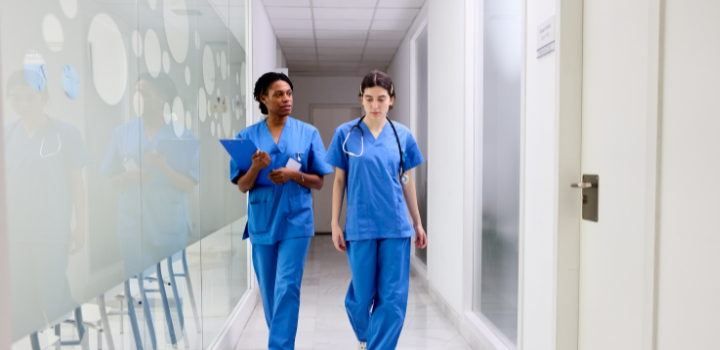Accessible lab design wins Hidden REF Award
By: Communications

Dr Katherine Deane's Access All Areas in Labs team designed the UK's first highly accessible clean room pharmaceutical lab, which has won "Highly Commended" in the Hidden REF Awards.
The Hidden REF Awards aim to shine a light on the people and outputs of research that are traditionally ignored in the paper-focussed REF.
The Access All Areas in Labs team surveyed more than 150 people with an interest in disability access in labs about current standards of lab access and access solutions in use. Unfortunately, the survey identified that most labs have substantial access barriers in their design and use.
The survey results informed the creation of a suite of access guidelines that cover the whole of the lab working ecosystem. These guidelines informed the design of the Catapult Cell and Gene Therapy ATMP lab, and ensured that the design of the laboratory can accommodate scientists with most types of impairments.
Currently, disabled scientists are drastically under-represented in the workforce. This lack of diversity has a negative impact on research culture, and the utility and quality of research outputs. Laboratories are often designed without consideration to disability access, due to the historic assumption that disabled scientists could not work safely in such environments. If disabled people’s needs are not designed into work and workplaces, then few disabled people will be able to work there.
Accessibility is about much more than just meeting minimum building standards. In laboratory settings, these standards do not go far enough, meaning current laboratories do not usually meet an access standard that will provide opportunities for disabled scientists.
Access All Areas in Labs
The Access All Areas in Labs team started with the assumption that all disabled scientists are able to work in labs, if the labs are designed with their access needs met. Safety issues can be designed “out” of the labs; either in the structural or equipment design, or in the protocols used. Accessibility also includes the design of the work processes, staff knowledge and attitudes. Accessible labs will allow a greater proportion of disabled scientists to be trained and work in lab settings in a safe and comfortable manner.
Dr Deane said: “I genuinely believe improving the accessibility of the spaces in which research is conducted will improve the diversity in the workforce, which will enhance the quality and potential profitability of the work done in laboratory settings.”
The Access All Areas project was created by a team of people with a range of disabilities and access expertise. They worked with researchers, technicians, building contractors, equipment manufacturers and disability access experts to gain a diversity of perspectives.
Disability is often the forgotten diversity in Equity, Diversity, and Inclusion (EDI) plans. The usability of structures in which research is conducted are often overlooked. If disabled researchers cannot get into the labs to work, then they cannot influence the research culture within them.
The high frequency of barriers for disabled scientists to use current lab infrastructure and the low level of knowledge required to solve these access problems, means that this project is an essential “black swan” to prove that solving these access challenges is possible. This lab offers proof of concept; it is hoped that it will pave the way for the development of future laboratories in the UK and beyond.
Related Articles

Fewer nurse hours available to patients linked to higher hospital death rates
Hospitals with fewer registered nurses at the bedside are seeing higher-than-expected death rates, according to a new study involving UEA researchers.
Read more
The untold story of life with Prader-Willi syndrome – according to the siblings who live it
New research from the University of East Anglia (UEA) reveals the hidden struggles experienced by the brothers and sisters of people with Prader-Willi syndrome.
Read more
Addressing the gap in community care for neurological patients at UEA’s Community Clinic
Norfolk residents living with neurological disorders have praised the impact of UEA’s student-led physiotherapy sessions as the first cohort nears its completion.
Read more